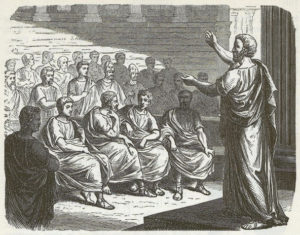What came next at the All-Star Theologians Reunion was almost beyond belief! There had been a few awkward moments to be sure but by and large the church “fathers” had behaved themselves reasonably well in spite of old disagreements. That all changed dramatically when Athanasius asked for a few moments to address the group “from the heart”. He said he didn’t have any carefully prepared remarks but simply wanted to share his feelings. This was an exceptional request from a man who had spent his entire life speaking “from the head.” Now he wanted to share what was in his heart!
Athanasius Liked to Argue!
A few people thought Athanasius might have mellowed since the great Ecumenical Council in Nicea. His request to make a few remarks at this particular session was taken by  some as a clue that he wanted to sow peace and reconciliation in the Body of Christ. It turned out they were wrong. He still felt like arguing! Interestingly enough, the session he chose for sharing his heart was listed on the Reunion Program as “The Mark of the Lamb“. The theme was “By this shall all men know you are my disciples if you have love for each other.” The irony of what followed was exquisite.
some as a clue that he wanted to sow peace and reconciliation in the Body of Christ. It turned out they were wrong. He still felt like arguing! Interestingly enough, the session he chose for sharing his heart was listed on the Reunion Program as “The Mark of the Lamb“. The theme was “By this shall all men know you are my disciples if you have love for each other.” The irony of what followed was exquisite.
Athanasius Against the World!
Athanasius’ adversaries had some pretty uncharitable nicknames for him (you’ll have to research them yourself if you’re interested). Suffice it to say his enemies were not shy about using well-placed insults when it suited them. History tells us that Athanasius was known for his adversarial and confrontational approach and was generally argumentative with everyone! Maybe it was his basic temperament or maybe he just liked arguing since he was so good at it. Athanasius even had his own brand name and became known as “Athanasius Contra Mundum” which meant “Athanasius Against the World”.
Athanasius Argued With Everyone!
Our great theologian from Alexandria argued with just about everyone! His most notable conflicts were with Arius, Eusebius and Emperor Constantine, along with Emperors Constantius II, and Emperors Valens and Julian too. Athanasius used his political connections to excommunicate and banish his religious rivals whenever he was in favor with a particular Roman Emperor. Sometimes though, the political tides would turn against him and then his rivals would exile and excommunicate him! His career was an ongoing drama of forced exiles followed by a return to ecclesiastical power… until the next time. Then the cycle would start all over again. Four different Roman Emperors excommunicated and banished Athanasius on five different occasions! That’s just how it goes when you hitch your wagon to an earthly star and Athanasius had hitched his wagon firmly to the power of the Roman empire.
Heretics, Scoundrels and Traitors
Athanasius: Beloved friends and brothers! You all know it is my custom to bring you well-reasoned and eloquent arguments for our doctrines and traditions but today my heart is stirred and the time has come for something more. I have a few things to get off my chest and want to clear the air about how some people have treated me. Most of you already know that Eusebius is a scoundrel through and through! If he wasn’t I wouldn’t have gone to all the trouble of having him banished and excommunicated in the first place. It was a great disappointment to me when afterwards he got Constantine’s ear and had me excommunicated and banished. What a rat!
Arius, Constantine and Eusebius Were All Against Him!
I was faced with Arius the heretic, Emperor Constantine the backstabber and Eusebius the weasel and they were all against me! I’m not going to bore you with all the sordid details of how they shamelessly disagreed with some of my finest theological arguments for the trinity. It is enough to say they did and they were not the only ones! Emperors Constantius II, Valens and Julian also banished me a few times after I’d been excommunicated by some second-rate bishops and councils who were just jealous of my prominence.
Athanasius Excommunicates Everyone!
What really gets under my skin is that the reunion organizers allowed some of these characters to come to this reunion and even let them speak! I can’t even tell you how ticked off I am about that! Anyway, they are such colossal disappointments I have decided to excommunicate all of them personally and permanently. Yes, that includes the reunion organizers too! I have made up my mind so there is no need to convene a council or take a vote or anything like that. Don’t go running to old Constantine either! His days are over and his power is broken. I’m warning you ahead of time. Don’t even try to argue with me because it won’t do you any good. Just remember that the creeds you know and believe in were my writings and ideas!
A Janitor Rebuked the Great Theologian
Pragmatticus was up in the rafters again and had heard all he could take. He didn’t start cussing but he did have something to say. “That’s the whole problem Smarticus! The things you argued for and established were your ideas and that’s why they caused so much trouble. You were smart enough to overwhelm your human opponents but you will never overwhelm God! If the things you taught were simply God’s words they would have brought peace and blessing to those who heard them. Your prideful words only brought division and bloodshed. The legacy of your dogma started with your arrogant claim that to be saved men had to think of God in the incomprehensible way you declared. You will be remembered for your brazen desire to banish and excommunicate anyone who disagrees with you. Thank God the Kingdom is not yours!
remembered for your brazen desire to banish and excommunicate anyone who disagrees with you. Thank God the Kingdom is not yours!
Athanasius: I recognize that voice! That’s the janitor Pragmatticus! Who does he think he is to disagree with me? People like him who don’t even have an advanced degree in theology really aggravate me! How did he get invited to our reunion anyway? I hereby excommunicate him too. No one gets in the Kingdom unless I say so… and I say it takes understanding and complying with the creed that bears my name!
A Still Small Voice Was Heard…
A Still Small Voice was heard saying, “Truly, truly I tell you I am the door of the sheep. I am the way and the truth and the life. No man comes to the Father but by me. I am the door. If anyone enters by me he shall be saved and shall go in and out and find pasture.”
Some listeners decided there was a big difference between what was in the heart of Athanasius and what was in the heart of God.
PS: We don’t think the Athanasian Creed expresses what is in the heart of God at all! That’s our honest opinion anyway. What’s yours? By the way… we’d sure appreciate it if you would share this website with a friend. Believing Christians should at least be aware of the perspective we try to share at www.theologyallstars.com Thanks and God Bless.
Copyright 2021 by Bob Shutes

 strokes a player might claim, Constantine had the final say. This was especially true of his own scores. No one dared challenge the accuracy or math of the emperor’s scorecard! On the very first hole took nine strokes to put his ball in the cup but he gave himself a three! Then he proudly declared that he had just made par on his very first hole ever!
strokes a player might claim, Constantine had the final say. This was especially true of his own scores. No one dared challenge the accuracy or math of the emperor’s scorecard! On the very first hole took nine strokes to put his ball in the cup but he gave himself a three! Then he proudly declared that he had just made par on his very first hole ever!